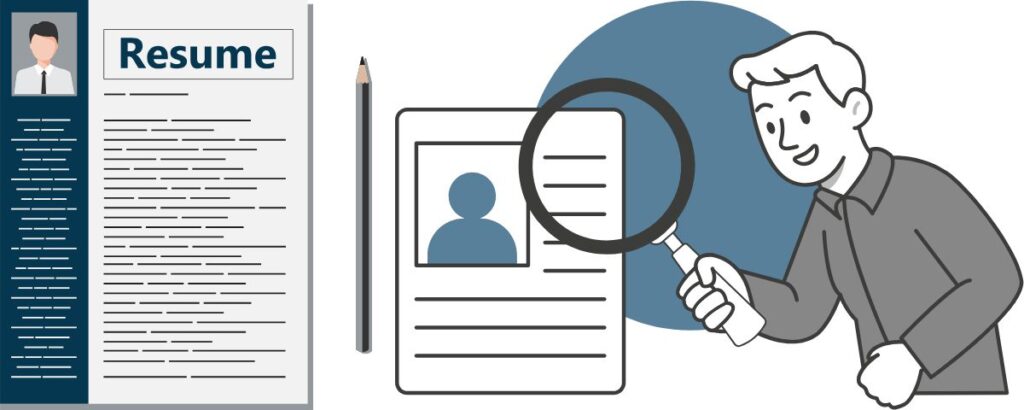
Internship Resume for Freshers: How to Write a Resume for Internship That Stands Out
June 29, 2025
Top Resume Summary Examples for Freshers: Your Practical Guide to Standing Out!
July 13, 2025Top 10 Common Resume Mistakes for Freshers and How to Avoid Them
Landing your first job can feel like climbing a mountain, but your resume is the rope that helps you reach the summit. Every year, thousands of recent graduates enter the job market with high hopes and ambitious dreams. However, many stumble at the first hurdle due to common resume mistakes for freshers, especially college students entering the job market, mistakes that could easily be avoided with the right guidance.
Your resume serves as your personal marketing document, and it needs to make a powerful impression within seconds. Research shows that hiring managers spend only seven to nine seconds on initial resume screens, making every word count. This reality makes it crucial to understand and avoid the most common pitfalls that could derail your job search before it even begins. By steering clear of these common mistakes, you can ensure your resume stands out to employers and increases your chances of landing an interview.
Understanding the Stakes: Why Resume Mistakes Matter

The competition for entry-level positions is fierce, with the average corporate job posting receiving 250 applications. Many candidates make similar mistakes in their job applications, reducing their chances of success. Among these applications, many contain preventable errors that immediately disqualify candidates from consideration. Understanding common resume mistakes for freshers isn’t just about following rules—it’s about giving yourself the best possible chance to showcase your potential and land that dream job.
Modern hiring processes have evolved significantly, with 99.7% of recruiters now using applicant tracking systems (ATS) to filter candidates. Many companies rely on ATS software to automatically screen and rank resumes based on keywords, skills, and qualifications relevant to the job opening. This technological shift means that fresher resume errors to avoid extend beyond simple typos to include formatting issues that could make your resume invisible to hiring software. The good news is that once you understand these common pitfalls, you can craft a resume that stands out for all the right reasons.
Mistake #1: Creating Generic, One-Size-Fits-All Resumes
One of the most damaging common resume mistakes for freshers is using the same resume for every job application. This approach screams “I’m not particularly interested in your company” to potential employers. Instead, you need to tailor your resume for each position, highlighting relevant skills and experiences that match the specific job description. Researching the company’s culture, mission statement, and values, and tailoring your resume to the company’s specific needs, shows that you understand and align with what the company is looking for.
Successful resume customisation involves analysing the job posting carefully. For each job opening, customise your resume to match the requirements and expectations for the same position you are applying for, ensuring your experience and achievements reflect the specific responsibilities of that role. This strategy not only helps you pass the ATS screening but also demonstrates genuine interest in the role. Remember, employers want to feel special and see clear evidence of how you fit their specific organisation.
Mistake #2: Neglecting Your Professional Summary
Many freshers either skip the professional summary entirely or create generic statements that add no value. Your professional summary is prime real estate; it’s the first thing hiring managers read and can determine whether they continue reviewing your resume. A compelling summary should highlight your relevant skills, experiences, and career objectives while incorporating keywords from the job description. Including a resume objective can be especially helpful for freshers or those making a career change, as it clarifies your goals and intentions to employers.
Avoid overused phrases like “hardworking” or “team player” without context. Instead, focus on specific achievements and skills that demonstrate your value proposition. For example, rather than writing “excellent communication skills,” you might say “developed presentation skills through leading student organisation meetings for 50+ members”.
Mistake #3: Overlooking Grammatical Errors and Typos
Grammatical errors represent one of the most critical fresher resume errors to avoid. Studies reveal that 77% of hiring managers will immediately reject resumes containing typos or poor grammar. Grammar mistakes and spelling errors are especially damaging, as they can harm your chances by making a negative impression on potential employers. These mistakes signal a lack of attention to detail, a skill highly valued across all industries.
The solution involves multiple layers of proofreading. First, use tools like Grammarly to catch obvious errors. Then, read your resume aloud to identify awkward phrasing or sentences that don’t flow naturally. Finally, ask a trusted friend or family member to review your resume with fresh eyes. This multi-step approach helps ensure your resume maintains professional standards throughout.
Mistake #4: Failing to Optimise for Applicant Tracking Systems
ATS optimisation represents a crucial aspect of modern resume writing that many freshers overlook. These systems scan resumes for specific keywords and formatting elements before human eyes ever see your application. To improve your chances of passing ATS screening, it is essential to include key skills in a dedicated skills section, ensuring that your most relevant abilities are clearly highlighted and aligned with the job description. Common ATS-related mistakes include using fancy graphics, tables, or unusual fonts that confuse the software.
To avoid these issues, stick to standard fonts like Arial or Times New Roman, use simple formatting, and avoid placing important information in headers or footers. Additionally, ensure your contact information appears in the main body of your resume rather than in decorative elements that ATS cannot read. Save your resume as a PDF or Word document, avoiding image formats that ATS cannot process.
Mistake #5: Including Irrelevant or Excessive Information
Information overload ranks among the most common resume mistakes for freshers. Many new graduates feel pressure to fill space and end up including irrelevant details that distract from their qualifications. Your resume should focus exclusively on experiences and skills relevant to the target position. Including only essential information ensures you make the best use of valuable space on your resume.
Avoid including personal information like age, marital status, or religious affiliation, as these details aren’t relevant to job performance and could lead to discrimination. Similarly, resist the urge to list every job you’ve ever held—focus on roles that demonstrate transferable skills or relevant experience. Keep your resume to one or two pages maximum. Many employers expect concise resumes due to the limited space available to showcase your qualifications, so ensure every piece of information serves a purpose.
Further reading:
Resume Objective for Freshers: Crafting Your Career Objective
Essential Guide to Crafting a Resume for Freshers Without Experience
Best Resume Format for Freshers: A Guide to Standing Out
Should You Have a Photo on Your CV? What You Need to Know
Mistake #6: Using Unprofessional Contact Information
Your contact details make the first impression before recruiters even read your qualifications. Using unprofessional email addresses like “partyanimal2023@email.com” immediately undermines your credibility. An unprofessional email address is one that is informal, contains nicknames, slang, or irrelevant numbers, and is not appropriate for professional correspondence. Three in ten resumes are disregarded by recruiters for having unprofessional email addresses.
Create a professional email address using your first and last name, such as “mary.smith@email.com”. Ensure your phone number is current and your voicemail message sounds professional. If you include social media links, make sure your profiles present a professional image consistent with your career goals.
Mistake #7: Focusing on Duties Instead of Achievements
Many freshers list job responsibilities rather than accomplishments, which represents a significant missed opportunity. Listing responsibilities simply describes what you were expected to do, while highlighting achievements in your past experience shows the impact you made and the value you brought to your roles. Hiring managers want to understand not just what you did, but how well you did it and what results you achieved. This approach transforms your resume from a static job description into a compelling success story.
You don’t need to list every job you’ve ever held; instead, strategically present your jobs to showcase your most relevant accomplishments and transferable skills, especially if you are addressing a career change. Quantify your achievements whenever possible using specific numbers, percentages, or timeframes. For example, instead of writing “responsible for social media management,” try “increased social media engagement by 35% over six months through consistent content creation and community interaction”. Even small accomplishments become impressive when properly quantified and contextualised.
Mistake #8: Poor Formatting and Visual Presentation
Visual presentation significantly impacts how recruiters perceive your resume. Poor formatting can make even excellent content appear unprofessional and difficult to read. Common formatting mistakes include using multiple fonts, inconsistent spacing, and cramming too much information onto the page.
Maintain consistent formatting throughout your document, using the same font family and size for similar elements. Create clear section headers and use bullet points to break up large blocks of text. Ensure adequate white space around margins and between sections to create a clean, organised appearance that’s easy to scan quickly.
Mistake #9: Neglecting Employment Gaps or Inconsistencies
Employment gaps are common for recent graduates, but failing to address them properly can raise red flags for employers. Rather than hoping recruiters won’t notice, address gaps proactively by including relevant activities during those periods. This might include volunteer work, additional coursework, certifications, personal projects, or extracurricular activities that develop relevant skills and help fill employment gaps.
If you have short gaps (less than a year), consider listing only years instead of months in your employment dates. For longer gaps, create dedicated entries explaining what you accomplished during that time, such as “Gap Year: Volunteer English Teacher, Cambodia (2022-2023)”. This approach demonstrates transparency and shows you used your time productively.
Mistake #10: Weak Action Verbs and Passive Language
The language you use in your resume significantly impacts how hiring managers perceive your contributions. Weak action verbs like “worked,” “made,” or “took” fail to convey the significance of your accomplishments. These passive terms make your experiences sound less impressive than they actually were.
Replace weak verbs with strong, specific action words that clearly communicate your role in achieving results. Instead of “worked on a team project,” use “collaborated with five team members to develop…” or “led a cross-functional team that delivered…”. This shift in language transforms your resume from a passive recounting of duties into an active demonstration of your capabilities and impact.
The Power of Feedback: Why You Shouldn’t Skip This Step

One of the most overlooked steps in building a strong resume is seeking feedback from others. Even the most diligent job seekers can miss common resume mistakes, such as grammatical errors, awkward formatting, or including irrelevant information. That’s why it’s essential to have a fresh pair of eyes—whether it’s a trusted family member, friend, or career advisor—review your resume before you send it out.
Feedback can help you identify areas where your resume may not clearly highlight your relevant skills or align with the job description. A career advisor, in particular, can offer expert insights on how to present your skills and experiences in a way that appeals to hiring managers. They might spot sections where you can better showcase your strengths or suggest ways to tailor your resume to a specific company or job.
Don’t underestimate the value of this step. Constructive feedback can transform a good resume into a compelling resume that stands out from other candidates. By taking the time to review and refine your resume with input from others, you’ll avoid common resume mistakes and ensure your application is as strong and relevant as possible for your job search.
Finalising Your Resume: The Last-Minute Checklist

Before you hit “send” on your job application, take a moment to run through a final checklist to make sure your resume is polished and ready for potential employers. This last-minute review can make the difference between landing an interview and being overlooked.
Double-check for spelling and grammatical errors: Even minor mistakes can leave a negative impression, so proofread carefully.
Verify your contact information: Ensure your professional email address and phone number are correct and up-to-date.
Tailor your resume to the job description and company: Make sure your relevant skills and experiences are front and centre, and that you’ve included keywords from the job description for better applicant tracking system (ATS) compatibility.
Review your work history and relevant experience: Confirm that all dates, job titles, and responsibilities are accurate and reflect your most recent and relevant experience.
Check formatting consistency: Use the same font, spacing, and bullet points throughout your resume for a clean, professional look.
Keep it concise: Limit your resume to one or two pages, depending on your experience, and use white space effectively to make it easy to read.
Include relevant keywords: Incorporate terms from the job description to help your resume pass through applicant tracking systems.
By doing so, you’ll ensure your resume is error-free, visually appealing, and highlights the skills and experiences most relevant to the job and company you’re targeting. A thorough final review helps your resume stand out to both applicant tracking systems and hiring managers.
Submitting Your Resume: Best Practices for Freshers

Submitting your resume is the final step in your application process, and doing it right can set you apart from other candidates. As a recent graduate, it’s important to approach this step with care and professionalism to maximise your chances of landing your dream job.
Customise your resume for each job application: Highlight relevant skills and experiences that match the job description and company needs.
Use a professional email address and include a tailored cover letter: These small details make a strong first impression on hiring managers.
Research the company: Incorporate keywords from the job description and company website to show you’ve done your homework and are genuinely interested in the role.
Focus on actual accomplishments and responsibilities: Go beyond listing job titles—use bullet points to showcase what you achieved in each role.
Keep your resume concise: Limit it to one page if possible, using white space and bullet points to make it easy to scan.
Avoid common resume mistakes: Don’t include irrelevant information or use unprofessional language. Stick to a clear, concise format and avoid fancy fonts that can distract from your content.
Leverage tools and feedback: Use a resume builder or seek input from a career advisor to ensure your resume is as strong and effective as possible.
Prepare for the next step: Practice your public speaking skills so you’re ready for interviews when they come.
By following these best practices, you’ll create a compelling resume that highlights your skills and experiences, avoids common resume mistakes, and makes a memorable impression on hiring managers. Remember, your resume is your ticket to new job opportunities—make sure it reflects your best self and is tailored to each job application for maximum impact.
Building Your Path to Success
Avoiding these common resume mistakes for freshers puts you ahead of many other candidates who haven’t taken the time to understand these crucial details. Highlighting your professional experience and the right skills can help job candidates stand out to a potential employer. Remember that your resume is a living document that should evolve as you gain experience and apply for different positions. Each application presents an opportunity to refine your approach and better align your presentation with employer expectations.
Your journey as a fresh graduate may feel challenging, but armed with knowledge about these fresher resume errors to avoid, you’re well-equipped to create a compelling resume that opens doors to exciting opportunities. Take time to implement these strategies, seek feedback from mentors or career counsellors, and consider consulting a career expert for valuable insights to further improve your resume and job search strategy. Remember that persistence combined with a well-crafted resume will ultimately lead you to success in your chosen field.




